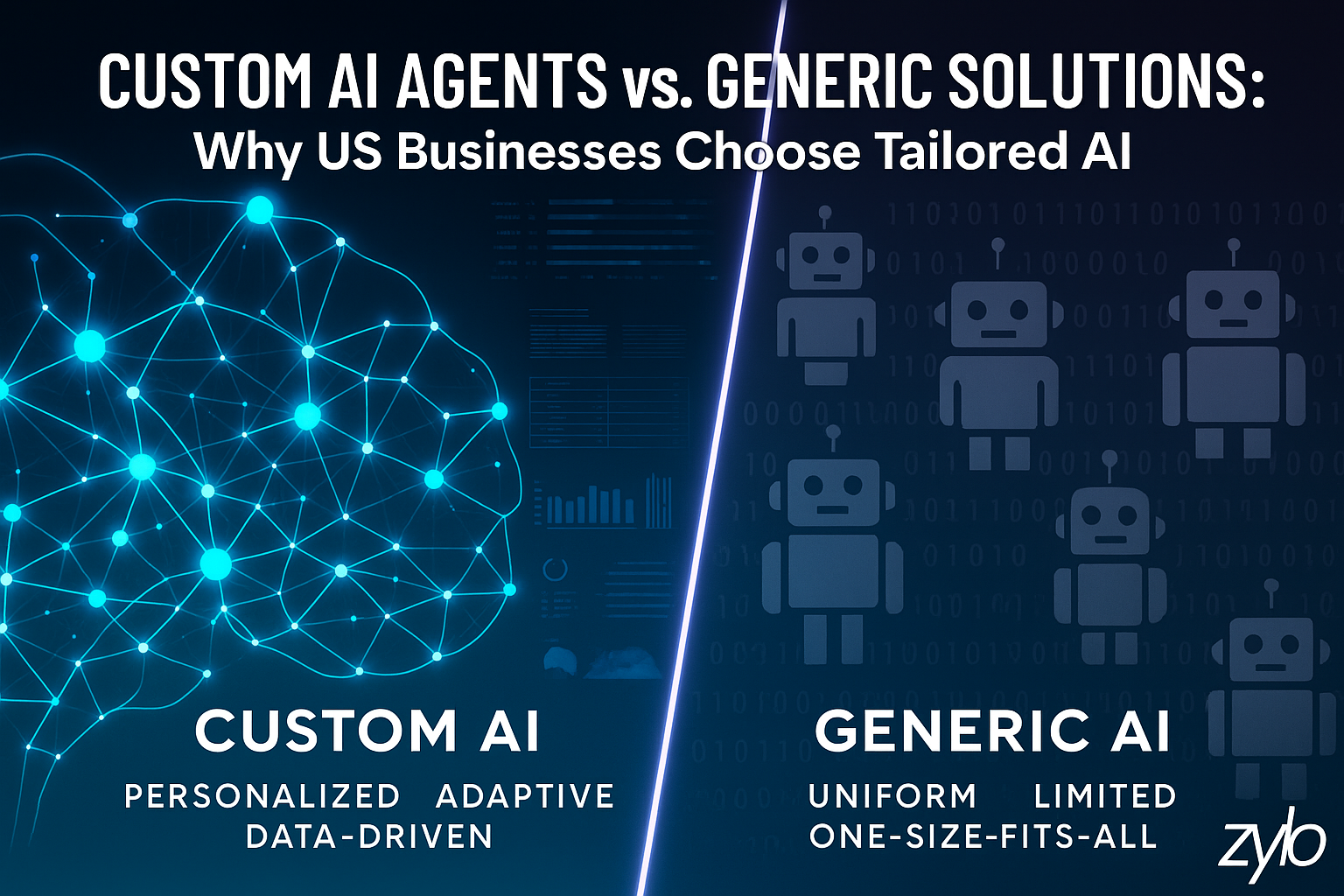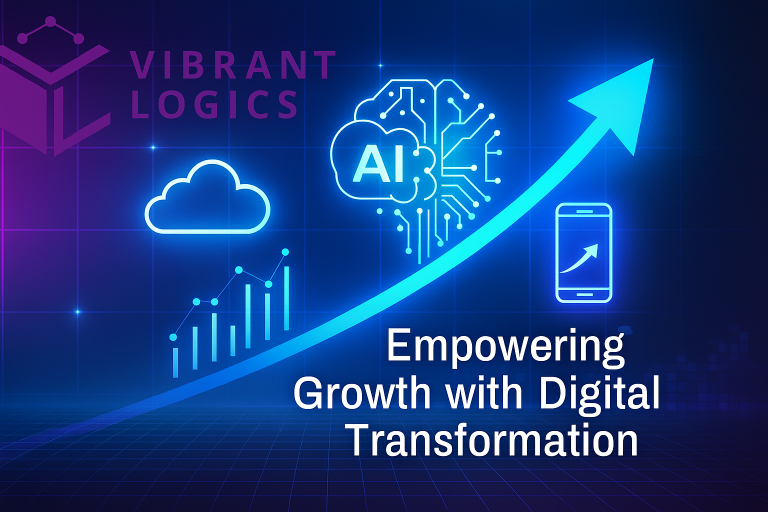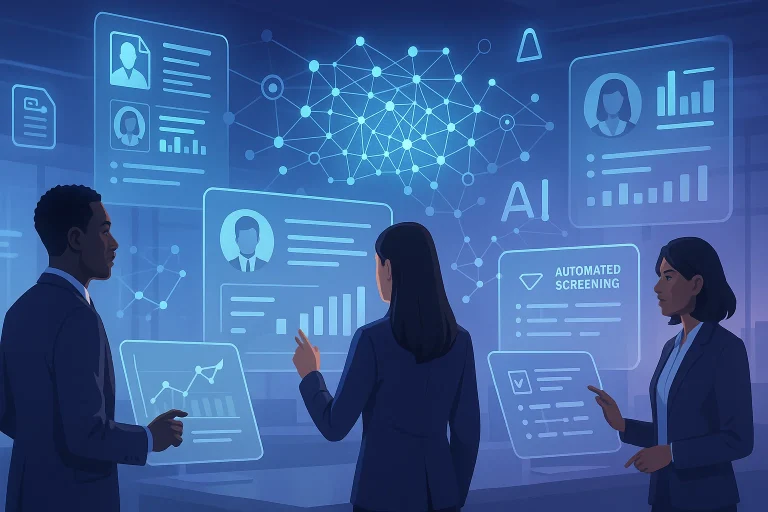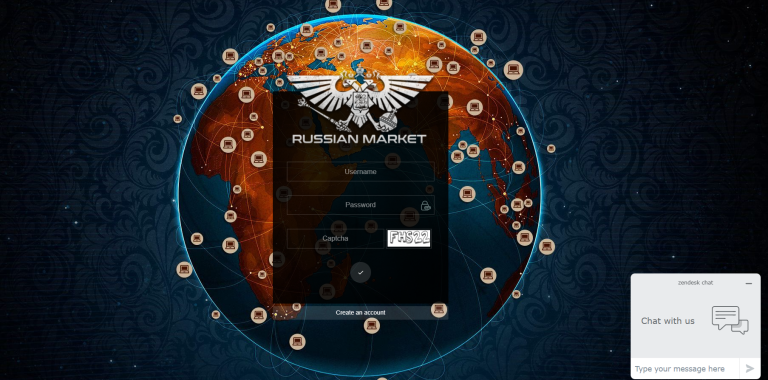Custom AI Agents vs. Generic Solutions: Why US Businesses Choose Tailored AI
The rise of artificial intelligence has created a clear divide in the American business landscape. Companies now face a critical decision: implement custom AI agents for businesses USA or settle for off-the-shelf generic solutions. This choice directly impacts operational efficiency, competitive advantage, and long-term growth potential.
Custom AI agents for businesses USA deliver specialized automation that aligns with specific workflows, industry regulations, and company objectives. Generic AI tools offer broad functionality but lack the precision required for complex business operations. Understanding this distinction helps decision-makers invest in technology that actually solves their problems rather than creating new ones.
What Are Custom AI Agents For Businesses?
Custom AI agents are specialized software systems built to handle specific business tasks through autonomous decision-making and learning capabilities. These agents integrate directly into existing systems like CRM platforms, ERP software, and proprietary databases.
Unlike generic solutions, custom agents understand company-specific terminology, processes, and goals. A manufacturing firm’s custom agent recognizes production codes, supplier relationships, and quality control standards unique to that operation. A healthcare provider’s agent navigates HIPAA compliance requirements while managing patient data workflows.
The development process involves:
- Analyzing current workflows and pain points
- Designing AI logic that matches business rules
- Training models on company-specific data
- Integrating with existing software infrastructure
- Testing across real operational scenarios
Why Generic AI Solutions Fall Short Compared to Custom AI Agents for Businesses in the USA
Generic AI tools are designed for mass-market appeal. They solve common problems but ignore the operational nuances that define competitive businesses.
Consider customer service automation. A generic chatbot answers frequently asked questions using pre-programmed responses. It handles simple inquiries but fails when customers ask about specific products, pricing tiers, or account issues unique to your business model. The conversation quickly escalates to human agents, defeating the automation purpose.
Generic solutions create three major problems:
Data security concerns. Off-the-shelf AI often stores data on third-party servers. US businesses handling sensitive information face compliance risks with regulations like CCPA, GDPR for EU customers, and industry-specific requirements.
Limited integration capacity. Generic tools connect to popular platforms but struggle with proprietary systems. Companies end up building workarounds that create data silos and manual transfer processes.
Inflexible functionality. When business needs evolve, generic solutions require vendor updates. Custom agents adapt through retraining and configuration changes without waiting for software providers.
How Custom AI Agents Transform Business Operations
Custom agents handle repetitive tasks while learning from each interaction. This creates compounding efficiency gains over time.
A logistics company built a custom agent to optimize route planning. The system considers real-time traffic data, driver schedules, delivery time windows, and fuel costs. After six months, delivery times decreased by 23% while fuel expenses dropped 18%. Generic route optimization software couldn’t account for the company’s specific fleet characteristics and customer service commitments.
Financial operations benefit significantly. Custom agents process invoices, flag discrepancies, and route approvals based on company-specific authorization hierarchies. They recognize vendor patterns, identify duplicate charges, and predict cash flow needs using historical spending data.
Sales teams use custom agents for lead qualification. These systems analyze prospect behavior across multiple touchpoints, score leads using company-defined criteria, and prioritize outreach based on conversion probability. The agent learns which signals predict successful deals for that specific business.
The ROI Advantage: Custom vs. Generic AI Investment
Generic AI subscriptions seem cost-effective initially. Monthly fees range from $50 to $500 per user depending on functionality. However, hidden costs accumulate through workarounds, manual processes, and limited scalability.
Custom AI development requires upfront investment. Development costs vary based on complexity, integration requirements, and data processing needs. The payback period typically ranges from 12 to 24 months.
Here’s how the economics work:
A mid-sized distribution company spent $85,000 developing a custom inventory management agent. The system automated reorder decisions, predicted seasonal demand fluctuations, and optimized warehouse space allocation. Within 18 months, the company reduced inventory carrying costs by $127,000 annually while decreasing stockouts by 34%.
Generic inventory software would cost approximately $12,000 annually but required manual adjustments for the company’s multi-location operation and specialized product categories. The generic solution couldn’t process the company’s unique supplier lead time variations or account for regional demand differences.
Industry-Specific Applications Driving Custom AI Adoption
Healthcare providers use custom agents to navigate complex billing codes, insurance verification processes, and treatment authorization workflows. These systems reduce claim denials by identifying documentation gaps before submission.
Manufacturing operations deploy custom agents for predictive maintenance. The agents monitor equipment sensor data, recognize failure patterns specific to machinery configurations, and schedule maintenance during optimal production windows.
Financial services firms build custom agents for compliance monitoring. These systems review transactions against evolving regulatory requirements, flag suspicious patterns based on institution-specific risk parameters, and generate audit-ready documentation automatically.
Retail businesses create custom agents that manage dynamic pricing across multiple channels. The systems consider inventory levels, competitor pricing, seasonal trends, and customer segment behavior to optimize margins while maintaining competitiveness.
Data Privacy and Security: Why Custom Matters
US businesses handle increasingly sensitive information. Customer data, proprietary processes, and competitive intelligence require protection beyond what generic AI providers guarantee.
Custom agents operate within company-controlled infrastructure. Data processing happens on private servers or dedicated cloud instances. This architecture provides:
- Complete visibility into data access and usage
- Compliance with industry-specific regulations
- Protection of proprietary business logic
- Control over model training data sources
Generic AI services often include broad terms of service that grant vendors rights to anonymized data. For businesses with unique competitive advantages, this creates intellectual property risks.
Implementation Realities: What to Expect
Custom AI development follows a structured timeline. Initial discovery and planning takes 2-4 weeks. Development and training requires 8-16 weeks depending on complexity. Testing and refinement adds another 4-8 weeks.
The process demands internal resources. Teams need to document current workflows, provide training data, and test system functionality. This time investment pays dividends through better system performance and higher adoption rates.
Successful implementations share common characteristics:
- Executive sponsorship that allocates necessary resources
- Clear success metrics defined before development starts
- Phased rollout that allows for adjustments
- Ongoing training data collection to improve accuracy
- Regular performance reviews and optimization cycles
Making the Decision: Custom or Generic?
Business size doesn’t determine the right choice. Small companies with unique processes benefit from custom solutions while large enterprises sometimes use generic tools effectively.
Ask these questions:
Does your competitive advantage depend on operational efficiency? Custom agents amplify unique processes that differentiate your business.
Do regulations require data sovereignty? Custom solutions provide complete control over information storage and processing.
Will your AI needs evolve significantly? Custom agents adapt to changing requirements without vendor dependency.
Are current manual processes consuming excessive resources? Custom automation delivers ROI when labor costs significantly outweigh development investment.
The Future Belongs to Adaptive AI
The gap between custom and generic AI solutions continues widening. As businesses demand more sophisticated automation, off-the-shelf tools struggle to keep pace with specialized needs.
Custom agents learn continuously from company-specific data. This creates self-improving systems that become more valuable over time. Generic solutions update on vendor schedules, often adding features that most users don’t need while ignoring specific pain points.
Taking the Next Step
US businesses choosing custom AI agents gain operational advantages that compound over time. These systems don’t just automate tasks—they understand context, learn from outcomes, and adapt to changing conditions.
The decision to build custom AI requires careful consideration of current processes, growth plans, and competitive positioning. Companies that invest strategically in tailored solutions create efficiency moats that generic tools cannot match.
Ready to see what custom AI can do for your operations? Zylo builds AI agents that actually understand your business. We don’t sell generic chatbots or one-size-fits-all automation. We develop intelligent systems that integrate with your existing tools, learn your specific workflows, and deliver measurable results. Our team works directly with US businesses to design, deploy, and optimize custom AI agents for businesses USA that solve real problems—not just add another software subscription. Let’s talk about what tailored AI can do for your bottom line.








